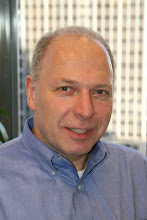Teachers are not poets? Depends on the teacher, of course. I'm talking about the ones who get you out of yourself, the ones who get you to think - willingly and freely - who tap into your imagination. How do they do it?
One way they do it is by asking questions.
Not just any questions, of course. Police officers ask questions. And if you remember Dragnet, you know what they're after: "just the facts, ma'am." That's their job: to find out what happened, or, at least, what each individual thinks happened. If they ask enough people, triangulate, correct for skews, they just might get at that elusive essence: The Objective Truth.
Lawyers ask questions, too. But a trial lawyer asks a question for a calculated purpose: to put a fact into evidence. The lawyer asks the question to get the witness to say what the lawyer expects the witness to say. Purposeful, but not what this post is about.
Salespeople ask questions. Many of their questions are designed to lead to a particular kind of answer. The saleperson may not know what that answer is, but it's got to be of a certain nature - one that will create an opportunity - or make it much clearer that there cannot be one.
Are we getting warmer?
Scientists ask questions, too. Scientists asks questions because they really do want answers. They have to be very careful about how they ask, and what they assume when they get some kind of answer. If they do frame the question carefully, painstakingly, persistently, and logically, they move us ahead, one nano-step question at a time. Not fun - but eventually, effective.
A question defines a process - a mental process. A question is a tool - sometimes a hammer, sometimes an unfortunate screwdriver. Sometimes - when we are at our most creative, or most lucky - a question can act as a lever.
What good is a lever? In case you have not been hanging on every word of this blog for the past 18 months...a lever has at least one valuable characteristic: it enables you to increase the amount of output you can gain for a relatively small amount of input.
This is the point at which I'm going to turn to two of my favorite social scientists and get to the point: JP Guilford, Mary Meeker, and the Structure of Intellect (SOI) model. And I'm going to look at just a part of a part of their cube, to focus on two kinds of questions: convergent questions, and divergent questions.
Convergent questions are aimed at particular kinds of answers; in essence, they ask responders to converge on particular kinds of responses. There may be some dispute about the correct answer, but the ballpark you're in is well-defined:
Who were the hitters with the highest averages of all time?
Which are the largest cities in Europe?
Which cars have the highest trade-in values?
And these are the police and lawyer questions. The target for the answer may sometimes be open to interpretation, but it's a target, nevertheless. We know about where it is, approximately how large it is, and what direction we need to look to see it.
Divergent questions are different animals. Chameleons? No, more evanescent than a chameleon. A divergent question asks me to open my mind and imagine:
What hitters would you rather not face?
What do you see as the most interesting cities in Europe?
How do you value your car?
These questions are divergent because individual answers can diverge greatly - in fact, move in completely different directions - and still be reasonable responses to the same question. They are questions that lead to questions, to ideas, and perhaps - to new thinking.
Divergent questions are the levers of great teachers...and of poets. Shall I compare thee (this increasingly frigid MN winter day) to a summer's day?
Wednesday, November 17, 2010
Teachers, Poets, Questions
Labels:
convergent,
divergent,
JP Guilford,
questions,
Structure of Intellect
Subscribe to:
Post Comments (Atom)

No comments:
Post a Comment